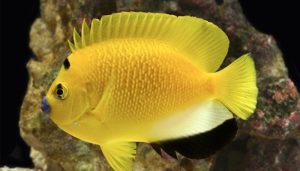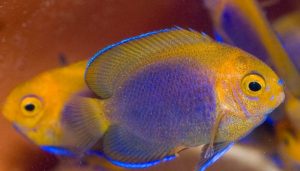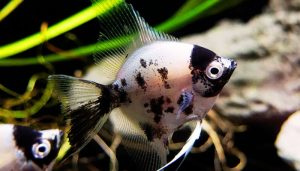Why is my betta fish bloated? If you’ve noticed your betta fish looking unusually swollen or struggling to swim, you might be dealing with betta fish bloating. This common issue can be alarming for pet owners, especially when their vibrant, lively betta suddenly appears unwell.
Bloating in bettas isn’t just a cosmetic concern—it can be a symptom of underlying health problems, from poor diet to serious infections like dropsy. Understanding the causes and early warning signs is crucial for ensuring your betta’s health and happiness.
In this blog post, we’ll explore everything you need to know about bloated betta fish. We’ll break down the vet-reviewed causes, how to identify the symptoms before it’s too late, and the most effective bloated betta fish cure you can implement today.
Whether you’re a seasoned aquarist or a new betta owner, this guide will help you confidently address and prevent bloating issues.
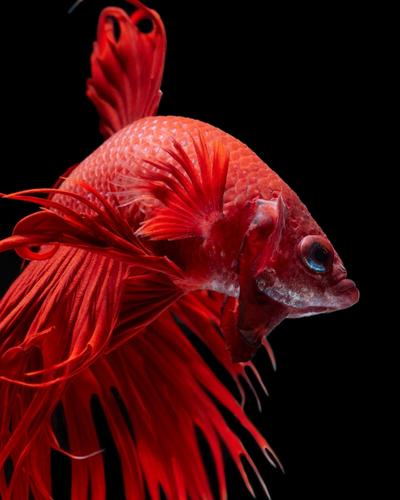
We will also discuss the symptoms to look out for and how to differentiate bloating from other health issues. Furthermore, we will provide practical and effective treatment options for betta fish bloating, such as fasting, adjusting their diet, and using medication when necessary.
Don’t let uncertainty jeopardize the well-being of your finned friend. Keep reading to uncover practical tips and expert advice to restore your betta’s vibrant, thriving life. Your betta depends on you—let’s dive in!
Table of Contents
ToggleWhy My Betta Fish is Bloated?
If your betta fish is bloated, it may indicate several potential problems. One common issue is overfeeding. Betta fish have small stomachs and can only eat small amounts at a time.
If you’re giving your fish too much food, it may be causing bloat in betta fish. Another potential cause of bloating in bettas is constipation. This can happen if your fish only eats dry pellets and needs more fiber. Bacterial or parasitic infections can also lead to bloating in betta fish.
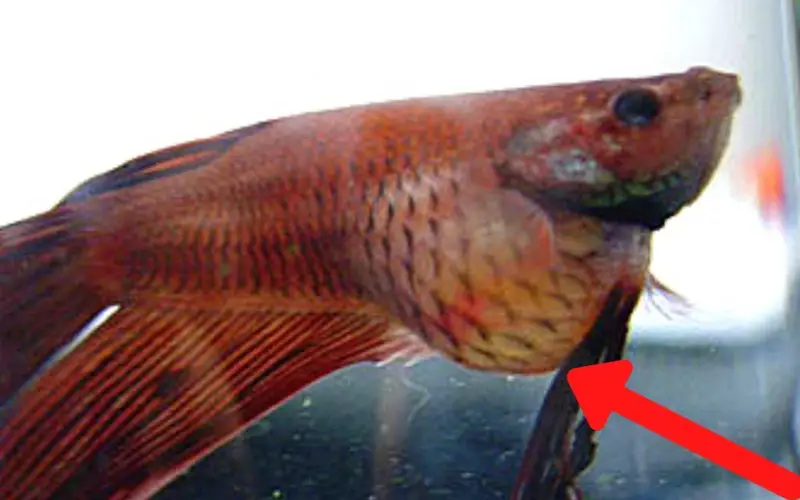
If you notice your betta fish belly bloated getting larger and displaying other symptoms like lethargy, loss of appetite, or changes in its feces, it may suffer from an infection.
It’s essential to closely monitor your bloating Betta fish and promptly address any potential issues. If the bloating persists or is accompanied by other concerning symptoms, it’s best to consult with a veterinarian who specializes in fish for proper diagnosis and Treatment.
What Causes Bloat in Betta Fish?
Bloat in betta fish can be caused by various factors, ranging from simple dietary issues to underlying severe health problems. Here are some of the most common criminals:
Dietary causes:
- Overfeeding: This is the most common cause of bloat. Bettas have small stomachs and only need a few pellets twice a day. Overfeeding can lead to indigestion and bloating.
- Low-quality food: Cheap pellets often contain fillers and additives difficult for bettas to digest. Look for high-quality pellets made with whole fish meal and shrimp meal.
- Dry food: Dry food can expand in the stomach, causing bloat. Soak pellets in water for a few minutes before feeding to avoid this.
- Inappropriate food: Bettas are carnivores and shouldn’t be fed plant-based foods like peas or flakes. Stick to meaty foods like pellets, brine shrimp, bloodworms, and daphnia.
Health-related causes:
- Constipation: This can happen if a betta isn’t getting enough fiber in its diet or its digestive system is sluggish.
- Bacterial infections: Some bacteria can cause fluid buildup in the abdomen, leading to bloat.
- Parasitic infections: Parasites can damage the intestines and disrupt digestion, causing bloat.
- Organ dysfunction: Kidney or liver problems can impair fluid removal from the body, leading to bloat. This is often called dropsy, a more severe condition requiring immediate veterinary care.
Other factors:
- Poor water quality: Dirty tank water can stress your Betta and weaken its immune system, making it more susceptible to bloat.
- Sudden changes in water temperature or pH: These can also stress your Betta and contribute to bloat.
How to identify the cause of bloat:
- Appearance: Look for other symptoms like pineconing scales, lethargy, loss of appetite, and difficulty swimming. These can point to underlying health problems.
- Recent changes: Consider any recent changes in your Betta’s diet, water parameters, or environment.
3 Common Causes of Betta Fish Bloating
Betta fish, or Siamese fighting fish, can experience bloating for various reasons. Bloating is often a symptom rather than a specific condition; different underlying issues can cause it. Here are three common causes of betta fish bloating:
1. Overfeeding Your Betta Fish
- One of the most common reasons for betta fish bloating is overfeeding. Bettas have small stomachs and can only eat a small amount of food at a time. Overfeeding your Betta or providing difficult food for them to digest can lead to bloating. Uneaten food in the fish tank can also contribute to water quality issues.
Solution: Feed your Betta in small portions, and ensure they consume all the food within a few minutes. High-quality betta pellets or flakes are recommended, and it’s essential to remove any uneaten food promptly.
2. Bettas Constipation:
- Bettas can suffer from constipation, which may result in bloating. Constipation can occur if the fish is fed too many dry foods, such as pellets, without a balanced diet that includes some live or frozen foods. Lack of fiber in their diet can lead to digestive issues.
Solution: Include a variety of foods in your Betta’s diet, such as live or frozen brine shrimp, daphnia, or bloodworms. Soaking dry pellets before feeding can also help prevent constipation.
3. Malawi Bloat Disease:
While Malawi bloat is primarily a disease affecting African cichlids from the East African lakes like Lake Malawi and Lake Tanganyika, it’s not unheard of for bettas to contract it. It’s a serious illness that requires prompt attention.
What is Malawi Bloat? Malawi bloat is a digestive system disease caused by an overgrowth of protozoan parasites, flagellates explicitly, in the gut. These parasites damage the intestines, disrupt digestion, and prevent proper nutrient absorption. This leads to fluid buildup in the abdomen, causing the characteristic bloating.
Symptoms of Malawi Bloat in Bettas:
- Bloating: The most obvious symptom is a swollen abdomen, often appearing rounded or distended.
- Loss of appetite: Bettas with Malawi bloat will typically lose interest in food.
- Lethargy: They become sluggish and inactive, resting more on the bottom of the tank.
- Difficulty swimming: The bloating can make it difficult for bettas to swim normally, and they may appear clumsy or unbalanced.
- Pineconing scales: The scales of Betta could protrude outwards, giving them a “pinecone” appearance.
- Rapid breathing: They may breathe more rapidly than usual, struggling to get enough oxygen.
- Pale gills: Gills may appear pale or discolored.
Treatment for Malawi Bloat in Bettas:
If you suspect your Betta has Malawi bloat, acting quickly is crucial. Early diagnosis and treatment are essential for improving the chances of survival. Here are some pro steps you might take:
- Isolate the affected Betta: Immediately remove the sick fish from the main tank to prevent the spread of the disease to other fish.
- Perform a 50% water change: This will help improve water quality and remove potential pathogens.
- Epsom salt bath: Epsom salt baths can help reduce inflammation and swelling. Add 1 tablespoon of Epsom salt per gallon of water to a separate container and let the Betta soak for 10-15 minutes. Repeat this daily for 3-5 days.
- Medications: Consult with a veterinarian or aquatic specialist for appropriate medication. They may recommend medications like metronidazole or trichlorfon to target the parasite infection.
Signs that Your Betta Fish Is Pregnant
There are a few signs that can indicate your betta fish is pregnant. One of the most obvious is a noticeable increase in the size of betta fish bloated belly.
You may also notice that she is more lethargic and spends more time resting near the bottom of the tank. In addition, a pregnant betta may display a loss of appetite or a change in eating habits.
Finally, you may observe her creating bubble nests, a typical behavior in male bettas but can also be a sign of pregnancy in female betta fish. If you notice these signs, providing a comfortable and stress-free environment for your pregnant Betta is essential.
What Does a Bloated Betta Fish Look Like?
If your betta fish bloated, it can appear quite different from a healthy one, and unfortunately, it’s often a sign of an underlying health issue. Here are some critical visual indicators to look for:
Overall body shape:
- Swollen abdomen: The most obvious sign is a significantly distended abdomen, making the fish appear much rounder than usual. This swelling can sometimes extend to the gills and even the eyes.
- Pineconing: In severe cases, the scales may protrude outwards, giving the fish a “pinecone” appearance.
- Loss of streamlined form: Healthy bettas have a sleek, streamlined body shape. A bloated fish will lose this form and appear more bulky and awkward.
Swimming behavior:
- Difficulty swimming: Bloating can impair a betta’s swimming ability, making them sluggish and struggling to maintain balance. They may swim erratically, stay near the bottom of the tank, or even float on their side.
- Loss of buoyancy: Bloated betta fish may have trouble swimming due to buoyancy issues caused by internal fluid buildup.
Symptoms of Constipation in Betta Fish
Several symptoms can identify constipation in betta fish. One common sign is that the fish will appear bloated, especially around the abdomen. The bloating can make the betta fish look uncomfortable and affect its swimming ability. The fish may also become less active and seem to have a decreased appetite.
Another symptom of constipation in betta fish is the presence of white, stringy feces. This can indicate that the fish is struggling to pass waste due to constipation.
In severe cases, constipation can lead to swim bladder disorder, causing the fish to have difficulty maintaining its balance in the water. If you notice any of these symptoms in your betta fish, it is essential to alleviate constipation, such as feeding them a diet high in fiber and offering them live foods or peas to help them pass the blockage.
Symptoms of Dropsy in Betta Fish
Dropsy is a severe and, unfortunately, often fatal condition that can affect betta fish. It’s not a single disease but a symptom of various underlying issues that cause fluid buildup in the fish’s body. Recognizing the early warning signs of fish with dropsy is crucial for taking quick action and potentially saving your beloved Betta.
Here are some key symptoms of dropsy in betta fish to watch out for:
Physical:
- Swollen abdomen: This is the most common and noticeable symptom. The Betta’s belly will appear bloated and distended, sometimes with a “pinecone” appearance due to the sticking out of the scales.
- Scales: As the fluid builds up, the Betta’s scales may flare out or protrude, looking raised and ruffled.
- Eyes: Bulging eyes can be another sign of dropsy, caused by internal pressure pushing on the eyes.
- Fins: Clamped fins, held close to the body instead of flowing freely, can indicate weakness and discomfort.
- Pale gills: Loss of color in the gills, typically from a vibrant red to a pale pink or white, can signify anemia, often associated with dropsy.
Symptoms of Betta Swim Bladder Disease
Betta’s swim bladder disease is a common ailment that affects Betta’s fish, causing difficulty swimming and maintaining buoyancy. Some common symptoms of this disease include the fish swimming erratically, floating on its side, or struggling to reach the top or bottom of the tank.
Other signs of swim bladder disease in Betta fish include loss of appetite, bloating, and fecal matter trailing from the fish. Sometimes, the fish may even experience difficulty righting itself and become stuck at the bottom of the tank.
If your Betta fish exhibits any of these symptoms, seeking professional help as soon as possible is critical to avoid complications.
Several factors can cause swim bladder disease in Betta fish, including overfeeding, constipation, and bacterial infections. It is essential to prevent these issues by providing a balanced diet, maintaining proper water conditions, and seeking prompt Treatment for any signs of illness.
How to Cure Bloated Betta Fish: (Effective Bloated Betta Fish Treatment)
How to treat bloated betta fish? Unfortunately, bloat in betta fish can have several underlying causes, so there’s no single “one size fits all” Treatment. However, I can outline some practical approaches based on the possible causes:
Overfeeding:
- Fasting: This is the first step for most cases. Stop feeding your Betta for 24-48 hours, allowing their digestive system to rest and clear.
- Reduce food amount: Once fasting is complete, adjust the feeding amount to be the size of the Betta’s eye, 2-3 times a day.
- High-quality diet: Switch to a diet rich in protein and fiber, like pellets containing fish or shrimp meal. Avoid fillers and opt for variety, including brine shrimp, bloodworms, and daphnia.
Constipation:
- Epsom salt bath: Prepare a bath using one tablespoon of Epsom salt per gallon of water in a separate container. Acclimate your Betta for 10 minutes, then place them in the bath for 15-20 minutes. Monitor them closely and return to the main fish tank after the bath. Repeat daily for 2-3 days.
- Pea treatment: Defrost a frozen pea, remove the skin, and mash a portion the size of the Betta’s eye. Feed them this once or twice a day for a few days to promote digestion.
Bacterial infection:
- Water changes: Perform 25-50% daily water changes to improve water quality and remove potential pathogens.
- Antibiotics: Consult a veterinarian or experienced aquarist for specific antibiotic recommendations based on the suspected bacteria. Follow dosage instructions carefully.
- Quarantine: Isolate the affected Betta in a separate tank to prevent the spread of infection. Treat the main tank separately.
Dropsy (fluid buildup)
- Dropsy is a severe condition with a poor prognosis. Consult a veterinarian or experienced aquarist immediately.
- Bloated betta fish treatment options may include: Epsom salt baths, aquarium salt (not table salt!), antibiotics, and other medications to address the underlying cause.
- Provide optimal water quality with frequent water changes.
Remember:
- Early diagnosis and intervention are crucial for any betta health issue.
- Monitor your Betta closely for any changes in behavior or appearance.
- If unsure about the cause of bloat, seek professional advice from a veterinarian or aquarist.
I hope this information helps! It’s important to note that these are general guidelines, and the best course of action will depend on the specific cause of your Betta’s bloat. Always prioritize the health and welfare of your fish and seek professional guidance if needed.
How To Prevent Bloat In Your Betta Fish
It is essential to provide a balanced diet to prevent bloat in your betta fish. Overfeeding can lead to bloat, so feed your betta fish a small amount of high-quality food once or twice a day. It’s also crucial to avoid feeding your betta tropical fish foods known to cause bloat, such as brine shrimp and bloodworms.
Additionally, ensure that the water in your betta fish’s tank is clean and adequately filtered. Poor water quality can stress your betta fish and make them more susceptible to digestive issues like bloat.
Regular water changes and proper tank maintenance are essential to keeping your betta fish healthy and bloat-free. Paying attention to their diet and environment can help prevent bloat in your betta fish and ensure they live a long and happy life.
Things To Avoid With a Bloated Fighting Fish
A bloated fighting fish can be a worrying sight, but you can help your finned friend feel better with the proper care. Here are some things to avoid when dealing with a bloated betta:
Food and feeding:
- Overfeeding: This is the most common cause of bloating. Bettas have stomachs the size of their eyes, so stick to feeding them 2-3 small pellets twice a day or the equivalent in other foods like brine shrimp or bloodworms. Remember to fast them once a week for digestive clearance.
- Inappropriate food: Some foods, like flakes or freeze-dried peas, can expand in the Betta’s stomach and cause blockage. Stick to high-quality betta pellets and occasional treats like bloodworms or brine shrimp. Soak dried food for a few minutes before feeding to prevent rapid expansion.
Water quality and environment:
- Dirty water: Ammonia and nitrite buildup from poor water quality can stress your Betta and worsen bloating. Perform regular water changes (20-25% every week) and siphon out any uneaten food or debris.
- Extreme temperatures: Fluctuations or improper water temperatures can stress your Betta and affect digestion. Maintain a consistent temperature between 78-80°F using a reliable aquarium heater.
- Lack of exercise: A stagnant environment can contribute to digestive issues. Provide your Betta with plenty of hiding spaces and live plants to explore and encourage movement.
Handling and stress:
- Excessive handling: Stress can weaken your Betta’s immune system and exacerbate bloating. Handle your fish only when necessary and minimize the disturbance in its aquarium.
- Tank mates: Certain tank mates, especially aggressive tank mates, can stress your Betta and affect its health. Consider keeping your Betta in a solo tank or with peaceful community fish.
Things to remember:
- Observe your Betta’s behavior alongside the bloating. Look for symptoms like loss of appetite, difficulty swimming, or pineconing (raised scales).
- Early intervention is critical. If you suspect bloating, address the potential causes promptly.
- Consider consulting a vet or experienced aquarist for further guidance and bloated betta fish cure options.
You can help your bloated Betta recover and thrive with proper care and attention. Remember, prevention is always better than cure, so establishing good aquarium practices and feeding habits can go a long way in keeping your beautiful fighter fish healthy and happy.
Commonly Asked Questions about Bloating Betta Fish (FAQs)
Why does my Betta have a big stomach?
Several reasons could explain your Siamese fighting fish bloated stomach – poor diet, constipation, swim bladder issues, or serious infections. Observe behavior for clues. If lethargic or pinecone scales, consult a vet ASAP.
How do you fix a bloated betta fish?
To fix a bloated belly betta fish, fast them for 24-48 hours and then feed them a small, easily digestible meal. If the bloating persists, consult a veterinarian for further guidance.
How do you treat Betta fish bloat?
Fish bloat treatment depends on the cause. Isolate fish! Overfeeding: Fast your Betta for 1-2 days and switch to smaller meals. Constipation: Epsom salt bath, fiber-rich food. Swim bladder: Aquarium salt, frequent water changes. Consult a vet if it is severe or not improving.
What does an overfed betta look like?
Overfed bettas sport a swollen belly bulging beyond their body, often losing their sleek profile. Watch for lethargy, clamped fins, and difficulty swimming. Act fast to avoid serious health issues!
How does Epsom salt help with fish bloat?
Epsom salt acts as a laxative and can help relieve fish bloat by eliminating excess fluids and waste.
Is my Betta bloated or fat?
Determining whether your Betta is bloated or fat can be challenging. Bloat refers to an abnormal condition, while fatness is natural. Observe for signs of discomfort or changes in behavior to determine the cause.
How do you fix an overfed betta fish?
To fix an overfed betta fish, reduce the amount of food you give it and establish a regular feeding schedule. Monitor its behavior and adjust the portions accordingly.
How to treat swim bladder disease?
How to cure a bloated betta fish? To treat swim bladder disease in fish, try fasting them for 2-3 days, then feed them boiled and skinned peas. If the issue persists, consult a veterinarian for further assistance.
How do you treat a bloated fish?
Bloated fish often suffer from constipation. Offer high-fiber foods like blanched spinach or zucchini. Water changes and temperature fluctuations can also help. If symptoms persist, consult a vet.
Why does my betta have a huge stomach?
Why does my betta fish look bloated? A bloated betta fish can be due to several reasons, including overfeeding, constipation, internal parasites, or swim bladder disorder. It’s crucial to consult a vet for accurate diagnosis and treatment.
Conclusion
In conclusion, the health and well-being of our beloved betta fish should always be a top priority for every fish enthusiast. We’ve explored the causes of bloating in betta fish, ranging from overfeeding to poor water conditions. By understanding these factors and taking proactive measures, we can mitigate the risks and ensure our finned friends thrive in their aquatic homes. Remember, moderation is essential when it comes to feeding your betta fish.
Maintaining a clean and adequately cycled tank and regular tank water changes can go a long way in preventing bloating and maintaining optimal health. Additionally, keeping an eye on any changes in behavior or appearance and seeking veterinary advice when necessary is crucial. So, let’s continue to educate ourselves and spread awareness about betta fish care. Doing so can help prevent betta fish bloating and create a thriving environment for our vibrant aquatic companions.
You might also like
- Betta Fish Floating Sideways 101: (Main Causes & Quick Fix)
- Betta Fish Sickness Exposed: 7 Deadly Threats You Must Know!
- Bloated Stomach Betta Fish: Symptoms, Causes & Quick Fix!
- Overfeed Betta Fish 101: Recognizing Symptoms and Quick Fix
- Can Betta Fish Eat Tropical Flakes! (3 Better Alternatives)


